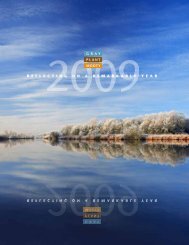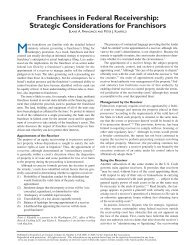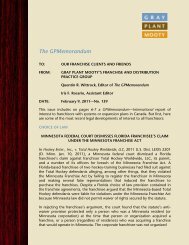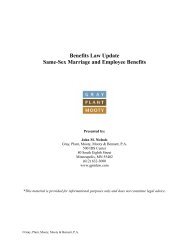Los Angeles Lawyer October 2008 - Gray Plant Mooty
Los Angeles Lawyer October 2008 - Gray Plant Mooty
Los Angeles Lawyer October 2008 - Gray Plant Mooty
You also want an ePaper? Increase the reach of your titles
YUMPU automatically turns print PDFs into web optimized ePapers that Google loves.
MCLE Test No. 174<br />
The <strong>Los</strong> <strong>Angeles</strong> County Bar Association certifies that this activity has been approved for Minimum Continuing<br />
Legal Education elimination of bias credit by the State Bar of California in the amount of 1 hour.<br />
MCLE Answer Sheet #174<br />
INSIDE THE BOX<br />
Name<br />
Law Firm/Organization<br />
1. A prosecutor’s exercise of peremptory challenges with<br />
the intent of excluding potential jurors on the basis of<br />
race violates the equal protection clause of the U.S.<br />
Constitution.<br />
True.<br />
False.<br />
2. A prima facie showing of discriminatory intent in the<br />
exercise of peremptory challenges may be made based<br />
solely on evidence concerning a prosecutor’s exercise<br />
of peremptories in a particular case.<br />
True.<br />
False.<br />
3. Only a defendant of the same race as the juror may<br />
oppose a peremptory challenge directed at that juror<br />
on the grounds that it is premised on race.<br />
True.<br />
False.<br />
4. Exercises of peremptory challenges by criminal<br />
defense attorneys are subject to challenge under the<br />
equal protection analysis set forth in Batson.<br />
True.<br />
False.<br />
5. Batson and Wheeler only apply to criminal cases.<br />
True.<br />
False.<br />
6. In California state and federal courts, peremptory<br />
challenges may not be exercised on the basis of gender.<br />
True.<br />
False.<br />
7. In California state courts, peremptory challenges<br />
may not be exercised based on the sexual orientation<br />
of a potential juror.<br />
True.<br />
False.<br />
8. When using the “jury box” method of jury selection,<br />
a federal district court in the Ninth Circuit may treat the<br />
pass of a peremptory challenge as waiving the subsequent<br />
ability to reach back and exercise a peremptory<br />
challenge against a juror seated in the box at the time<br />
of the pass.<br />
True.<br />
False.<br />
9. The “blind strike” method of jury selection is invalid<br />
in federal court because it permits one party to lose a<br />
peremptory challenge by exercising it against a juror<br />
who that party does not know has also been the subject<br />
of a peremptory challenge by another party.<br />
True.<br />
False.<br />
10. In the Ninth Circuit, under a “struck jury” system<br />
of jury selection, sequentially numbering potential<br />
jurors so that the parties know who will be the next to<br />
enter the box may result in the pass of a peremptory<br />
challenge being treated as the exercise of a peremptory<br />
challenge subject to challenge under Batson.<br />
True.<br />
False.<br />
11. Because jury selection is supposed to be color<br />
blind, it is always improper to ask the court to note the<br />
race of potential jurors for the record.<br />
True.<br />
False.<br />
12. Once a party raises a Batson/Wheeler challenge to<br />
the exercise of a peremptory, the court has the sole<br />
responsibility to ensure that the record is sufficient to<br />
preserve the point for review.<br />
True.<br />
False.<br />
13. In federal and state courts in California, “comparative<br />
juror analysis” is an important tool in assessing<br />
Batson/Wheeler challenges that should be used by<br />
the appellate court even if it was not used by the trial<br />
court.<br />
True.<br />
False.<br />
14. Some California state courts have questioned<br />
whether comparative juror analysis may be used in<br />
assessing whether a prima facie case of discriminatory<br />
intent has been made at the first step of the Batson/Wheeler<br />
analysis.<br />
True.<br />
False.<br />
15. In California state courts, absent a subsequent<br />
renewed objection, a trial court’s ruling regarding a<br />
Batson/Wheeler challenge is reviewed based on the<br />
record as it stands at the time the ruling is made.<br />
True.<br />
False.<br />
16. Demonstrating a prima facie case of discriminatory<br />
intent is impossible if a party has used a peremptory<br />
to strike only one member of a particular group.<br />
True.<br />
False.<br />
17. In assessing a Batson/Wheeler challenge premised<br />
on race, only the race of the jurors against whom the<br />
party has exercised peremptories is relevant.<br />
True.<br />
False.<br />
18. At the second step of the Batson/Wheeler analysis<br />
of a claim of racial discrimination, the court may assess<br />
the persuasiveness and plausibility of a proffered rationale<br />
that is facially race-neutral.<br />
True.<br />
False.<br />
19. If a court skips directly to the third step of the<br />
Batson/Wheeler analysis, it moots the preliminary<br />
issue of whether the party asserting the Batson/Wheeler<br />
challenge has made a prima facie showing.<br />
True.<br />
False.<br />
20. Exercising peremptories to remove all members<br />
of a particular race from a pool of potential jurors will<br />
always demonstrate racial discrimination in jury selection.<br />
True.<br />
False.<br />
Address<br />
City<br />
State/Zip<br />
E-mail<br />
Phone<br />
State Bar #<br />
INSTRUCTIONS FOR OBTAINING MCLE CREDITS<br />
1. Study the MCLE article in this issue.<br />
2. Answer the test questions opposite by marking<br />
the appropriate boxes below. Each question<br />
has only one answer. Photocopies of this<br />
answer sheet may be submitted; however, this<br />
form should not be enlarged or reduced.<br />
3. Mail the answer sheet and the $15 testing fee<br />
($20 for non-LACBA members) to:<br />
<strong>Los</strong> <strong>Angeles</strong> <strong>Lawyer</strong><br />
MCLE Test<br />
P.O. Box 55020<br />
<strong>Los</strong> <strong>Angeles</strong>, CA 90055<br />
Make checks payable to <strong>Los</strong> <strong>Angeles</strong> <strong>Lawyer</strong>.<br />
4. Within six weeks, <strong>Los</strong> <strong>Angeles</strong> <strong>Lawyer</strong> will<br />
return your test with the correct answers, a<br />
rationale for the correct answers, and a<br />
certificate verifying the MCLE credit you earned<br />
through this self-assessment activity.<br />
5. For future reference, please retain the MCLE<br />
test materials returned to you.<br />
ANSWERS<br />
Mark your answers to the test by checking the<br />
appropriate boxes below. Each question has only<br />
one answer.<br />
1. ■ True ■ False<br />
2. ■ True ■ False<br />
3. ■ True ■ False<br />
4. ■ True ■ False<br />
5. ■ True ■ False<br />
6. ■ True ■ False<br />
7. ■ True ■ False<br />
8. ■ True ■ False<br />
9. ■ True ■ False<br />
10. ■ True ■ False<br />
11. ■ True ■ False<br />
12. ■ True ■ False<br />
13. ■ True ■ False<br />
14. ■ True ■ False<br />
15. ■ True ■ False<br />
16. ■ True ■ False<br />
17. ■ True ■ False<br />
18. ■ True ■ False<br />
19. ■ True ■ False<br />
20. ■ True ■ False<br />
<strong>Los</strong> <strong>Angeles</strong> <strong>Lawyer</strong> <strong>October</strong> <strong>2008</strong> 27







